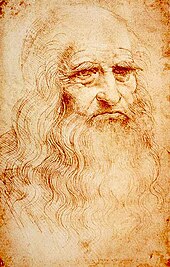Polymath
A universal scholar is a scholar with an unusually wide range of knowledge in various fields of science . A related term that was occasionally used in ancient times as an honorable epithet of a scholar - for example the grammarist Lucius Cornelius Alexander Polyhistor - is polyhistor (from ancient Greek πολυΐστωρ polyhístōr , German 'know a lot, learned' ). From the late 17th century onwards, however, polyhistory referred to the interdisciplinary, philological-historical learning. Even in antiquity, polyhistory and synonymous polymathy often had the negative connotation of sheer knowledge and color writing .
While the Latin genius universalis ("universal spirit") has largely the same meaning, the modern term universal genius contains the aspect that the scholar has produced extraordinary achievements or ingenious inventions in various fields .
history

portrait of Christoph Bernhard Francke , around 1700; Duke Anton Ulrich Museum , Braunschweig
The ancient Egyptian inventor and advisor Imhotep is considered to be the first named universal scholar (approx. 2700 BC). As an example of a universal scholar from ancient Greece , Aristotle can be cited , whose works were authoritative into the early modern period. In Roman antiquity, the most important polymath is Pliny the Elder ; the best-known example of a polyhistoric would be Marcus Terentius Varro .
Examples of versatile authors in the oriental cultural area are first the Persian Ibn Sina (around 980-1037), known in the West as Avicenna, who is considered an outstanding scientific personality of his time, the Syrian Ibn an-Nafis from the 13th century, who discovered the pulmonary circulation and author of a religious-philosophical novel, as well as the Cairo scholar as-Suyūtī (1445–1505), who covered almost all branches of knowledge in his work, from the Koran interpretation to Fiqh , hadith science, literature, lexicography, history, geography, to pharmacy and erotica.
Albertus Magnus , who made Aristotle known in the West again, was a medieval Christian polymath. He was not only a theologian and philosopher, but also educated in all areas of natural science. The Swiss scholar Conrad Gessner can also be described as a universal scholar .
Leonardo da Vinci is without a doubt the epitome of the universal genius . A contemporary of da Vinci was the Portuguese Duarte Pacheco Pereira , who was an outstanding scientist and used this knowledge in seafaring and warfare. In the age of the Reformation, Philipp Melanchthon was a figure who became known for his versatile knowledge. Famous examples of baroque polymaths are Gottfried Wilhelm Leibniz , his contemporary Isaac Newton and Johann Alexander Döderlein . For the time of the Enlightenment , Albrecht von Haller and Alexander von Humboldt should be mentioned. The versatile artistic geniuses Johann Wolfgang von Goethe and Rabindranath Tagore are considered universal geniuses.
Since the 19th century, the number of universal scholars declined because the knowledge of the subject areas increased enormously. Nowadays it is hardly possible for scholars to have a complete overview of even a single discipline such as history or mathematics. Science is characterized by an increasing specialization of the subject areas and the experts . For this reason there are no universal scholars in the original sense today. Today we tend to speak of universalists or generalists - people who have a wide range of interests or are active in many areas.
Quotes
In the poem The Polyhistor , the pious Christian Fürchtegott Gellert (1715–1769) contrasts a proud polyhistor with a man without education who appears humble. Both stand as shadows “by that river we all have to go to” and wait for Charon to take them to the other bank. The vain polyhistoric man laughs at the common man and tries to get ahead of him. But Charon recognizes which of the two is the smart one:
“Go back!” Cried Charon rather harshly,
“I have to run over the clever
one first, hardly anyone will come in a hundred years;
Alone in people of your kind who were
proud polyhistorians,
I soon got paralyzed. "
The Austrian cultural philosopher Franz Martin Wimmer sums up:
“In polyhistory, the ideal of comprehensiveness became effective above all: everything that is written finds its interest, its subject is the res literaria as such. The polyhistor bibliographies and reviews, and what he publishes is as comprehensive an annotated bibliography as possible. Such books, catalogs of works sorted by discipline, appeared as early as the middle of the 16th century. The most important polyhistor of the 17th century, Daniel Georg Morhof (1639–1691), in his 'Polyhistor literarius, philosophicus et practicus', created the prerequisites for the world histories of philosophy that emerged in the 18th century. "
See also
Web links
Individual evidence
- ^ Wilhelm Pape : Greek-German concise dictionary . 3. Edition. Vieweg & Sohn, Braunschweig 1914 (6th reprint of the 3rd edition from 1880). ; Polyhistor online at Duden. From the Greek ἵστωρ histōr "knowing" is also Greek-Latin. historia (literally: "knowledge") derived, cf. History at Duden online.
- ^ Martin Mulsow : Polyhistory. In: Gert Ueding (Hrsg.): Historical dictionary of rhetoric . Vol. 6. De Gruyter, Berlin 2003, ISBN 3-484-68106-3 , Sp. 1521-1526 .; Wilhelm Schmidt-Biggemann : Polyhistory / Polymathy . In: Joachim Ritter u. a. (Ed.): Historical dictionary of philosophy . Basel / Darmstadt 1971-2007, Vol. 7 (1989), Col. 1083-1085.
- ↑ See universal genius at Duden online.
- ↑ Gabriele Fois-Kaschel (ed.): Rabindranath Tagore. Another look at modernity. Un autre regard sur la modernité. Francke, Tübingen 2013, ISBN 978-3-7720-8499-7 , p. 13.
- ↑ See Generalist at Duden online.
- ↑ CF Gellert: The polyhistor in the Gutenberg-DE project
- ↑ History of Philosophy History - Philosophy History between Humanism and Polyhistory .
